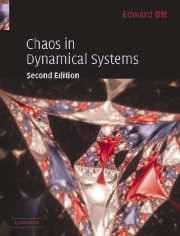Book contents
- Frontmatter
- Contents
- Preface to the first edition
- Preface to the second edition
- 1 Introduction and overview
- 2 One-dimensional maps
- 3 Strange attractors and fractal dimension
- 4 Dynamical properties of chaotic systems
- 5 Nonattracting chaotic sets
- 6 Quasiperiodicity
- 7 Chaos in Hamiltonian systems
- 8 Chaotic transitions
- 9 Multifractals
- 10 Control and synchronization of chaos
- 11 Quantum chaos
- References
- Index
7 - Chaos in Hamiltonian systems
Published online by Cambridge University Press: 05 June 2012
- Frontmatter
- Contents
- Preface to the first edition
- Preface to the second edition
- 1 Introduction and overview
- 2 One-dimensional maps
- 3 Strange attractors and fractal dimension
- 4 Dynamical properties of chaotic systems
- 5 Nonattracting chaotic sets
- 6 Quasiperiodicity
- 7 Chaos in Hamiltonian systems
- 8 Chaotic transitions
- 9 Multifractals
- 10 Control and synchronization of chaos
- 11 Quantum chaos
- References
- Index
Summary
Hamiltonian systems are a class of dynamical systems that occur in a wide variety of circumstances. The special properties of Hamilton's equations endow these systems with attributes that differ qualitatively and fundamentally from other sytems. (For example, Hamilton's equations do not possess attractors.)
Examples of Hamiltonian dynamics include not only the well-known case of mechanical systems in the absence of friction, but also a variety of other problems such as the paths followed by magnetic field lines in a plasma, the mixing of fluids, and the ray equations describing the trajectories of propagating waves. In all of these situations chaos can be an important issue. Furthermore, chaos in Hamiltonian systems is at the heart of such fundamental questions as the foundations of statistical mechanics and the stability of the solar system. In addition, Hamiltonian mechanics and its structure are reflected in quantum mechanics. Thus, in Chapter 11 we shall treat the connection between chaos in Hamiltonian systems and related quantum phenomena. The present chapter will be devoted to a discussion of Hamiltonian dynamics and the role that chaos plays in these systems. We begin by presenting a summary of some basic concepts in Hamiltonian mechanics.
Hamiltonian systems
The dynamics of a Hamiltonian system is completely specified by a single function, the Hamiltonian, H(p, q, t). The state of the system is specified by its ‘momentum’ p and ‘position’ q.
- Type
- Chapter
- Information
- Chaos in Dynamical Systems , pp. 246 - 303Publisher: Cambridge University PressPrint publication year: 2002
- 2
- Cited by



